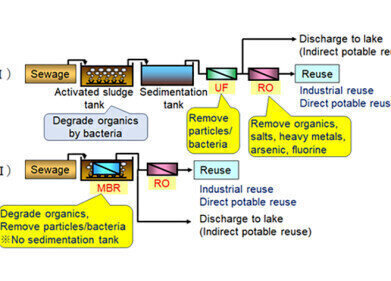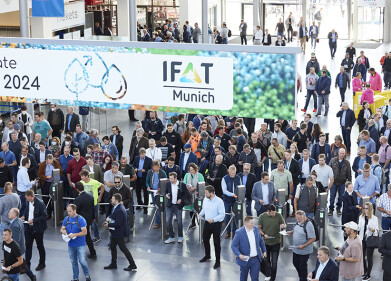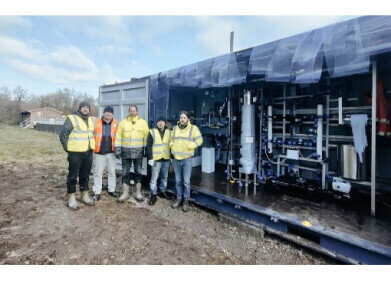-
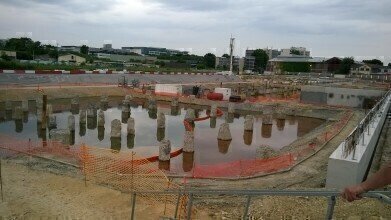 Partial view of the Metro construction site in Saint Quen: Two temporary basins containing contaminated groundwater in the foreground (photo: Tsurumi)
Partial view of the Metro construction site in Saint Quen: Two temporary basins containing contaminated groundwater in the foreground (photo: Tsurumi) -
 The brownish-red sludge has to go: in the centre of the image, at the edge of the basin, the FSP skimmer with its three red floats, connected via a hose to the mobile waste water treatment system just behind (photo: Tsurumi)
The brownish-red sludge has to go: in the centre of the image, at the edge of the basin, the FSP skimmer with its three red floats, connected via a hose to the mobile waste water treatment system just behind (photo: Tsurumi) -
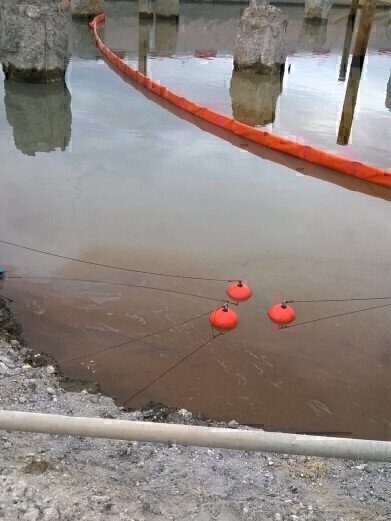 Multiple FSP submersible scum skimmers from Tsurumi extract the surface water reliably (photo: Tsurumi)
Multiple FSP submersible scum skimmers from Tsurumi extract the surface water reliably (photo: Tsurumi) -
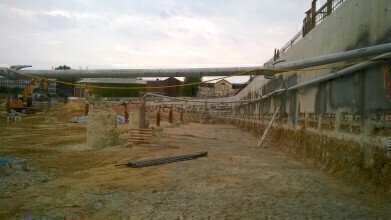 View inside a drained section of the site: the vertical steel pipes are well extensions; the water is fed to the collection basins via piping (photo: Tsurumi)
View inside a drained section of the site: the vertical steel pipes are well extensions; the water is fed to the collection basins via piping (photo: Tsurumi) -
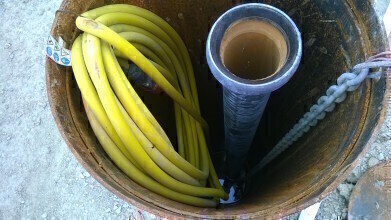 One of 72 well shafts in the set-up phase: the standpipe is clearly visible; an extension and the above-ground well casing will be installed later (photo: Tsurumi)
One of 72 well shafts in the set-up phase: the standpipe is clearly visible; an extension and the above-ground well casing will be installed later (photo: Tsurumi) -
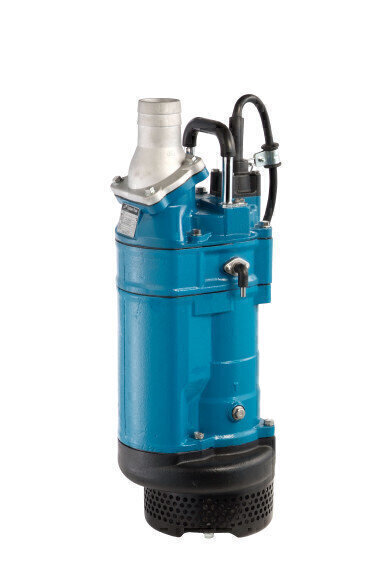 The KTZ and KTZE series are universal construction site pumps for tough usage environments from the market leader Tsurumi, which supplies all of Europe from its site in Düsseldorf. Pictured: a model with level sensor on side of housing (photo: Tsurumi)
The KTZ and KTZE series are universal construction site pumps for tough usage environments from the market leader Tsurumi, which supplies all of Europe from its site in Düsseldorf. Pictured: a model with level sensor on side of housing (photo: Tsurumi) -
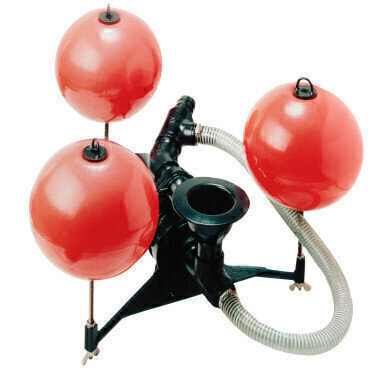 FSP submersible scum skimmer FSP from Tsurumi: extraction of the top layer of water through a suction opening just under the water line (photo: Tsurumi)
FSP submersible scum skimmer FSP from Tsurumi: extraction of the top layer of water through a suction opening just under the water line (photo: Tsurumi)
Water/Wastewater
Extracting Harmful Substances at the Surface: Japanese Skimmers Clean the Paris Metro
Jan 28 2017
First things first: the old contamination has to go. Modern skimmer pumps are used in the construction of Metro line 14 in Paris.
They extract contaminated surface water from multiple collecting basins. The client DPG from Morance brought them in to the construction project in the north-west of the French capital, where the Metro network is currently being extended. The city is expanding the underground station Mairie de Saint-Quen on line 13 into an interchange. Line 14 is being extended to the station at the same time. The new sections are planned to begin operation in 2017.
One section of the site previously housed a rail yard. Following its demolition, the cleansing of the around 2000 m2 site is now in full swing. The work is scheduled to take 15 months.
One of the problems faced is the soil, which is infiltrated with crude oil residues and other harmful substances, and the contaminated water produced during the work on this soil. DPG 72 set up wells to drain the ground. The water from these wells is gradually pumped into specially-erected basins for intermediate storage. After the sedimentation stage, Tsurumi 8-FSP submersible scum skimmers draw off the film of harmful substances. They are clearly identifiable by their three ball floats in striking red. “Each skimmer extracts around 250 l/min,” says Alexis Parrot, application specialist at DPG. The poisonous liquid is pumped on to the locally-installed treatment plant from GRS Valtech, he continues. “The skimmers are energy efficient, quiet and reliable.” According to the manufacturer, an engine power of just 750 Watt is sufficient. The suction opening of the floating extractor, which is secured with steel wires, is around 50mm below the surface of the water. The generators create a circular current and thus underpressure that sucks the contaminated surface water into the 50mm hose. This principle guarantees a stable suction effect: even air or foreign particles are sucked in. The distance from the water surface is adjustable. “Any foam on the surface is sucked in too, before it can be carried off by the wind.”
Appropriately, DPG also uses products from the Japanese manufacturer for the well – specifically the KTZ series, a universal construction site pump for contaminated water that, like the skimmers, was purchased from CE2A in Venelles. Tsurumi is considered the world market leader in this segment, and has its European headquarters in Düsseldorf. The KTZ47.5 model used extracts 1400 l/min from the suction pool and achieves conveyance heights of up to 40 meters. In terms of numbers, however, the sister series KTZE and its 37.7 is more strongly represented. Although it conveys slightly less at 900 l/min, it is controlled autonomously via a sensor. As an electrode, it is all but wear free, as it has no moving parts. It switches on the pump when the water level rises and, when the level falls again and a certain period has passed, switches it off again.
“This function is worth its weight in gold,” emphasises Parrot. “Although operation continues around the clock, the treatment process means that the feed is not constant.” The pumps convey the water fully independently, as needed, he says. Because the manufacturer states that they are suitable for dry running, Parrot does not anticipate any outages in the KTZ models (without electrode sensor). There have not been any so far, he says. “In just a few months, the Metro will be speeding through here as planned.”
Events
May 05 2024 Seville, Spain
May 13 2024 Munich, Germany
May 23 2024 Beijing, China
May 23 2024 Beijing, China
Jun 10 2024 Algiers, Algeria
